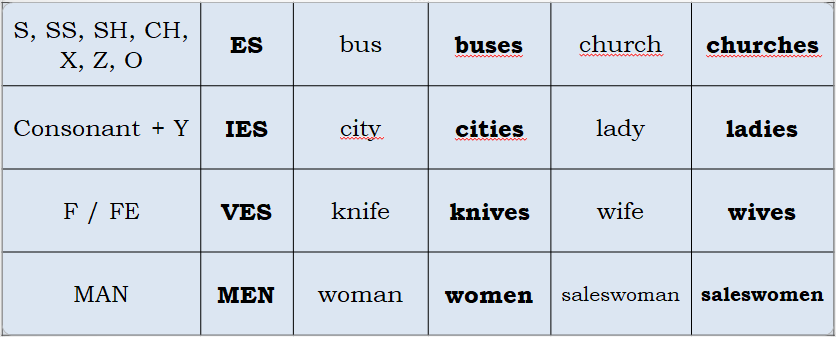Hello, students!
According to the website vocabulary.com, the word plural means more than one. Well, that is the definition of plural.
Nouns in English can be classified as Countable (Contáveis) and Uncountable (Incontáveis).
Countable nouns can be singular or plural:
(Os substantivos contáveis existem no singular e no plural)
- Dog – dogs (plural)
- House – houses (plural)
- Person – people (plural)
However, uncountable nouns don’t have a plural form:
(Os substantivos incontáveis não tem plural)
- Money (dinheiro)
- Air (ar)
- Furniture (mobília)
Plural rules
Basically, we add “S” to the and of a noun.
- Table – tables (plural)
- Plane – planes (plural)
- Doctor – doctors (plural)
However, in some cases, we have to follow some rules, depending on how the noun ends.
S/SS/CH/SH/Z/O/X
- Words ending in S/SS/CH/SH/Z/O/X get ES at the end.
- Bus – Buses (plural)
- Cross – Crosses (plural)
- Church – Churches (plural)
- Dish – Dishes (plural)
- Buzz – Buzzes (plural)
- Fox – Foxes (plural)
- Tomato – Tomatoes (plural)
F / FE
2. Words ending in F / FE get VES instead of F/FE:
(Palavras que terminam em F ou FE recebem VES ao invés de F/FE:)
- Wife – Wives (plural)
- Leaf – Leaves (plural)
- Knife – Knives (plural)
CONSOANTE + Y
3. Words ending in CONSOANT + Y get IES instead of Y:
(Palavras que terminam em CONSOANTE + Y recebem IES ao invés de Y)
- Country – Countries (plural)
- Baby – Babies (plural)
- Family – Families (plural)
Attention:
- Boy – Boys (plural)
- Ray – Rays (plural)
Here, the Y is not preceded by consonants, so the rule does not apply.
(Aqui, o Y não vem depois de consoantes, então a regra não se aplica.)
Irregular Plural
Some words do not follow those rules, we have to memorize them.
(Algumas palavras não seguem estas regras, então nós temos que memorizá-las.)
For example:
- Mouse – Mice (plural)
- Person – People (plural)
- Child – Children (plural)
- Goose – Geese (plural)
- Foot – Feet (plural)
- Tooth – Teeth (plural)
- Man – Men (plural)
- Woman – Women (plural)
- Fish – Fish (plural)
- Deer – Deer (plural)
- Sheep – Sheep (plural)
Plural only
There is another group which singular for does not exist.
(Existe um outro grupo de palavras que só existem no plural, ou seja, sempre terminando com a letra S).
(Existe um outro grupo de palavras que só existem no plural, ou seja, sempre terminando com a letra S).
- Jeans
- Scissors
- Glasses
- Pants
- Shorts
- Pajamas
- Headphones
- News
- Gymnastics
- Economics
- Mathematics
Singular only
Another group never take any plural form:
(Estas palavras não têm plural)
(Estas palavras não têm plural)
- Luggage (bagagem)
- Furniture (mobília)
- Information (informação)
Take a look:

Time to practice!
Exercise: Write the plurals following the example:
(Passe para o plural de acordo com o exemplo. Depois, confira suas respostas nos comentários.)
Example: an apple → two apples
a baby → ___________________
a foot → ___________________
an iron → ___________________
a butterfly → ___________________
a tooth → ___________________
an orange → ___________________
a key → ___________________
a watch → ___________________
a box → ___________________
an elephant → ___________________
a woman → ___________________
a brush → ___________________
an egg → ___________________
a man → ___________________
a church → ___________________
a bus → ___________________

Respostas: two babies, two feet, two irons, two butterflies, two teeth, two oranges, two keys, two watches, two boxes, two elephants, two women, two brushes, two eggs, two men, two churches, two buses, two umbrellas
ResponderExcluirVídeo:
ResponderExcluirhttps://www.youtube.com/watch?v=woel9NhgDbo